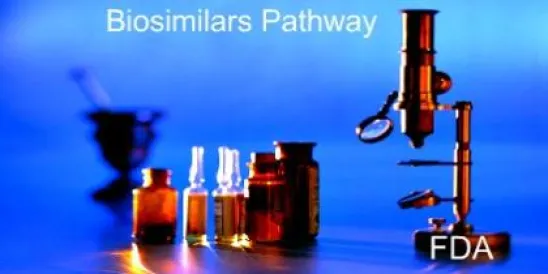The health care reform law, the Patient Protection and Affordable Care Act, includes a subtitle named the Biologics Price Competition and Innovations Act (BPCI Act) or the “biosimilars pathway,” to encourage competition in biotechnology drugs similar to the competition between brand name and generic pharmaceuticals. The FDA is expected to announce regulations governing the biosimilars pathway before the end of the year. In connection with the pathway, the FDA recently announced proposed user fees for biological products and its performance goals for reviewing applications and related steps leading to the approval of biological products.
The FDA’s performance goals for some of its review functions include gradually improving goals for the percentage of applications or supplements reviewed within a stated time from receipt. The FDA summarized these goals in the following tables:
Table 1.–Performance Goals for Original and Resubmitted Applications and Supplements
|
Submission Cohort |
Performance Goal |
||||
|
FY 2013 |
FY 2014 |
FY 2015 |
FY 2016 |
FY 2017 |
|
|
|
Within 10 Months of the Receipt Date |
||||
|
Original Biosimilar Biological Product Application Submissions |
70% |
70% |
80% |
85% |
90% |
|
|
Within 6 Months of Receipt Date | ||||
|
Resubmitted Original Biosimiliar Biological Production Applications |
70% |
70% |
80% |
85% |
90% |
Table 2.–Performance Goals for Original and Resubmitted Supplements
|
Submission |
Performance Goal |
|
Original Supplements with Clinical Data |
90% Within 10 Months of the Receipt Date |
|
Resubmitted Supplements with Clinical Data |
90% Within 6 Months of the Receipt Date |
|
Manufacturing Supplements |
90% Within 6 Months of the Receipt Date |
The FDA proposed “first cycle” review performance goals for original biosimilar product applications and for supplements with clinical data. The goal is to inform the applicant of any substantive review issues and a planned review timeline within 74 days of receipt of the application or supplement for 90 percent of the applications or supplements.
For proprietary names, FDA proposes to review 90 percent within 180 days for names submitted during biological product development and 90 percent within 90 days for names submitted with the application for approval.
The FDA’s goal is to respond within 30 days to 90 percent of appeals for disputes between the applicant and FDA staff over procedural or scientific matters related to the review of an application.
If FDA imposes a clinical hold on an application, its goal is to respond to 90 percent of applicants’ complete responses to a clinical hold within 30 days of receipt of a “complete response.”
If an applicant requests the FDA to review a special protocol to assess whether it addresses scientific and regulatory requirements identified by the applicant, the FDA’s proposed goal is to provide a written response according to the following gradually increasing percentages:
|
FY 2013 |
FY 2014 |
FY 2015 |
FY 2016 |
FY 2017 |
|
70% |
70% |
80% |
85% |
90% |
The final set of goals relate to the time frames to hold different types of meetings defined in the commitment letter. The percentage goals for holding the meetings are the same as those in the chart immediately above. The defined types of meetings and time frames are:
- Biosimilar Initial Advisory Meeting – an initial assessment limited to a general discussion regarding the feasibility of obtaining a license for the product and, if feasible, the expectations for the development program – 90 days
- Biological Product Development (BPD) Type 1 – a meeting necessary for an otherwise stalled drug development program to proceed, a special protocol assessment, or a meeting to address an important safety issue – 30 days
- BPD Type 2 – a meeting to discuss a specific issue or to obtain specific advice from FDA for an ongoing development program – 75 days
- BPD Type 3 – an in-depth data review and advice meeting – 120 days
- BPD Type 4 – a meeting to discuss the format and content of an application or supplement – 60 days
These goals are contingent on the FDA receiving $20 million (inflation adjusted) in non-user fee funds, plus the proposed user fee funds. FDA proposes four types of biosimilar user fees. The first three types are the same as those under the Prescription Drug User Fee Act (PDUFA). For the current fiscal year, the PDUFA fees are an application fee of $1,841,500, an establishment fee of $520,100 and a product fee of $98,700. The fourth type of fee is a biosimilar product development (BPD) fee for products in development. The initial BPD fee is 10 percent of the application fee and would be due upon submission of an Investigational New Drug Application or within five days after FDA grants the first request for a BPD meeting related to the product. After the initial fee, the applicant would pay another BPD fee annually, due on or before October 1, until the application is filed or the sponsor withdraws from the development program for the product. Prior BPD payments will be credited to the application fee.
For the complete text of the FDA proposals, see www.tinyurl.com/7nl9mm8 and www.tinyurl.com/7956vk2.




 />i
/>i
